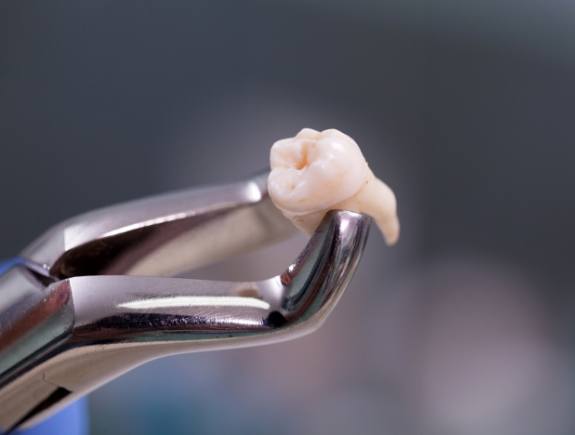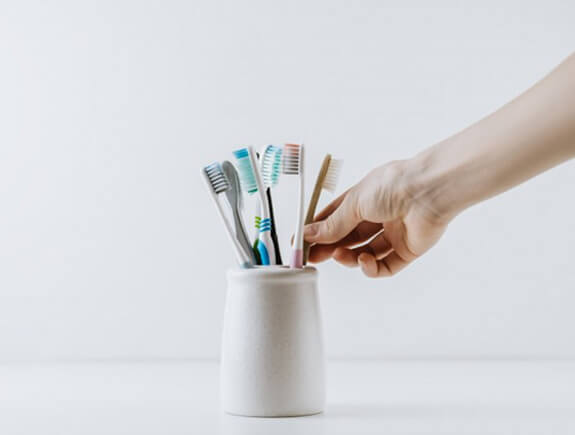Tooth Extractions – West Caldwell, NJ
Building a Healthier Foundation for Your Smile
We’ll do everything in our power to help you preserve your natural teeth. However, if a tooth is damaged beyond repair or is badly infected to the point that root canal treatment is no longer viable, we may have to perform a tooth extraction for the sake of your overall oral health. We’ll take whatever steps we can to make the process of getting a tooth extraction as comfortable as possible for you, and we’ll make sure that you’re fully aware of your tooth replacement options. Here’s a brief guide to tooth extractions in West Caldwell, but please contact our office if you’d like to learn more.
Why Choose Magid Dental Care for Tooth Extractions?
- Start-to-Finish Dental Implant Treatment
- Beautiful, Newly Renovated Dental Office
- Dental Sedation Available
When Are Tooth Extractions Necessary?

Here are some situations in which we may recommend removing a tooth:
- Decay has caused most of the tooth to erode, leaving us unable to treat it with a filling.
- An infection has spread to the roots and killed a tooth, leaving us unable to treat it with root canal therapy.
- A tooth is impacted below the gumline.
- A tooth is cracked or damaged beyond repair.
- Gum disease has caused the supportive tissue and bone to deteriorate around your tooth, causing it to become loose.
- Extraction is necessary to give the mouth enough room for orthodontic treatment
- The dental infection may spread to other teeth or potentially lead to dangerous secondary infections like sepsis.
The Process of Removing a Tooth

Before removing a tooth, Dr. Magid will administer an appropriate anesthetic treatment to ensure that the process is completely painless, and you may also receive dental sedation treatment to help you sit calmly and comfortably through the procedure. Then, he’ll use a tool called an elevator to lift the troubled tooth from its socket before grasping it with forceps and gently wiggling it free from its connective tissue. It’s best to replace lost teeth as soon as possible, so Dr. Magid will discuss your tooth replacement options during your consultation.
Tooth Extraction Aftercare

We’ll provide you with detailed aftercare instructions so you know exactly what to do to keep your recovery process going smoothly and comfortably. You can expect these to include:
- Take prescribed or over-the-counter medications as instructed
- 24 hours after your tooth extraction, rinse your mouth with a solution of eight ounces of warm water and half a teaspoon of salt to clean the surgical site and eliminate harmful bacteria
- Refrain from smoking, as this will hinder your gum’s ability to heal and fight infection
- Avoid drinking through a straw, as this causes shifting of pressure within the mouth that can dislodge the blood clot forming over the extraction site, leading to a painful condition called dry socket
- Refrain from strenuous exercise for a few days after the procedure
- Elevate your head with pillows or cushions when sleeping to stay comfortable
- Get plenty of rest
Replacing your missing teeth with a denture, dental bridge, or implant as soon as possible can also prevent a range of oral health issues such as the remaining teeth slipping out of alignment, gum injuries, and jawbone erosion.
Understanding the Cost of Tooth Extractions

If we determine that a tooth extraction is necessary in your case, we’ll make sure that you have an accurate idea of how much the procedure will cost. You can count on us to give you a trustworthy estimate, and we’ll always be upfront about the factors influencing the amount that you need to pay. Additionally, we can work with you to find ways to make it easier to fit a tooth extraction into your budget.
Factors That Can Affect Tooth Extraction Cost

The tooth extraction process will be carefully customized to meet your unique needs, which will ultimately help determine the final price tag. Some of the factors that can affect the overall cost of the procedure include:
- The Number of Teeth: In some situations, it may be necessary for us to remove more than one tooth. The more teeth involved, the higher the cost of the procedure will typically be.
- The Type of Tooth That Needs to Be Removed: Certain teeth (such as the molars near the back of the mouth) are harder to remove than others, which makes extracting them more costly.
- The Kind of Extraction Performed: A tooth that has fully erupted can be removed with a simple extraction. However, a surgical approach may be required if the tooth is impacted or has broken off at the gumline. A surgical extraction will usually come with a higher price tag.
- Your Chosen Method of Tooth Replacement: You can replace an extracted tooth with a partial denture, a dental bridge, or a dental implant. Naturally, each of these options comes with its own cost.
Does Dental Insurance Cover Tooth Extractions?

When it comes to dental insurance, you should never make any assumptions. It’s always a good idea to reach out to your insurance company to clarify what treatments your plan can help pay for as well as what your coverage looks like. Additionally, you can always ask our team for help if there’s any aspect of your plan that you don’t completely understand.
With all that said, many dental insurance plans do help pay for tooth extractions. Coverage is often around 50%, but this can vary depending on what plan you have. Also, certain aspects of your dental insurance plan could affect the amount you need to pay yourself, such as your deductible or your annual maximum.
How to Make Tooth Extractions Affordable

Dental insurance isn’t the only way you can make tooth extractions less of a burden on your bank account. At our office, patients can sign up for our in-house savings plan, which comes with significant discounts for many of our services. We also work with CareCredit, which lets patients break up the cost of their care into a series of monthly payments. Feel free to speak to our team to learn more about the financial options available at Magid Dental Care.
Tooth Extraction FAQs
Can I Smoke After Getting a Tooth Extracted?
Tobacco products, including cigars, cigarettes, and chewing tobacco can all delay healing. Because of this, it is important to refrain from smoking immediately following your tooth extraction. It is recommended that you abstain from smoking for at least five days afterward. However, if you can, it is best to avoid smoking for at least two weeks. If you have had difficulty quitting in the past, don’t hesitate to let us know. This way, we can better help you prepare for your procedure.
How Should I Prepare for My Tooth Extraction?
Preparing for your tooth extractions is just as important as following all of the aftercare instructions. Before your procedure, let your dentist know if you have any questions. If your dentist has any specific instructions, like sticking to just water the morning of or picking up prescription medicine, you should do so beforehand. It is also a good idea to arrange for a trusted adult to drive you home after your procedure since you will likely receive dental sedation.
What Risks Are Involved with Tooth Extractions?
Fortunately, tooth extractions are considered to be extremely safe. That being said, all dental procedures come with risks. With tooth extractions, the main concern is infection. Dry socket is another risk, which can be painful and delay the recovery process significantly. To keep these issues from happening, we will provide you with aftercare instructions and signs to look out for.
How Long After a Tooth Extraction Can I Get Dentures?
Generally speaking, it takes anywhere from six to eight weeks to get your dentures. Once you have completely healed, your dentist will take impressions of your mouth, which will be used to craft your restoration. During this time, they will make a note of the ideal size, shape, and shade for your replacement teeth so they can be custom crafted just for you. After they have been made, you will have to try them on with your dentist. Final adjustments can be made so you can show off a complete smile again!
Does Getting a Tooth Extracted Hurt?
Many patients are anxious about committing to dental treatments because of fear that a procedure will hurt. While it’s understandable that you might be apprehensive about having a tooth extracted, Dr. Magid always begins the process of removing a tooth by numbing the patient’s mouth to ensure that they feel no pain, and you may also receive dental sedation treatment if you need extra help sitting calmly through the procedure. While you can expect some soreness and discomfort after the extraction, you can minimize these issues by strictly adhering to your aftercare instructions to prevent infection and promote healing. If your discomfort seems to be worsening after a few days have passed, call our office, as this may be a sign of infection.
Is There an Alternative to Tooth Extraction?
While many tooth-replacement appliances like dental implants, bridges, and dentures are designed to look and work like real teeth, Dr. Magid's top priority is to preserve your natural smile. Sometimes, the loss of a severely infected tooth may be preventable with treatments like root canal therapy in the case of tooth decay or scaling and root planing in the case of gum disease. However, extraction is only recommended as a last resort after every other possible solution has been ruled out. If Dr. Magid recommends extraction, you can rest assured that it is the best way to restore the health of your smile.
What’s the Recovery for Tooth Extractions Like?
There is a long list of aftercare instructions to abide by while recovering after tooth extraction. One of the most important parts of ensuring a smooth recovery is taking care of the blood clot that forms over the tooth’s empty socket, as its loss can lead to painful conditions like dry socket. To prevent this, avoid smoking, spitting, and drinking through a straw, as these activities can dislodge this protective blood clot. You’ll also need to get plenty of rest while regularly cleaning your mouth by brushing, flossing, and rinsing with a solution of salt and warm water, but follow Dr. Magid’s instructions as to when how you should resume your oral hygiene habits. You can also expect to receive instructions to refrain from smoking, change gauze as needed, use a cold compress, stick to a soft diet, and take prescribed or over-the-counter pain medication. While each patient’s healing process is different, you can expect to start feeling better after about three days.
Can I Leave a Space Empty After a Tooth Extraction?
Many patients may be tempted to think that they don’t need to replace a tooth located in the back of the mouth, but this can lead to a range of oral and overall health issues. For example, the loss of even a single tooth can improperly redistribute the pressure of chewing among the remaining teeth, leading to uneven dental wear and tear. This can also make it harder to chew thoroughly, which can lead to issues like indigestion or malnutrition. You may even develop speech difficulties such as a lisp. We recommend booking a consultation for tooth replacement at our office as soon as you are done healing from your extraction.
